 The Union government hopes to sort out the issue of imposing the goods and services tax (GST) on petroleum after a few years of introducing the new indirect tax regime from 2016-17 but the transition seems far from being a smooth one.
The Union government hopes to sort out the issue of imposing the goods and services tax (GST) on petroleum after a few years of introducing the new indirect tax regime from 2016-17 but the transition seems far from being a smooth one.
This is because the Centre would need the concurrence of 20 states out of 29 to impose a GST on petroleum.
The Constitutional Amendment Bill, tabled in the Lok Sabha on December 23, seeks to bring petroleum under GST, but gives states the power to impose value-added tax (VAT), while the Centre will levy excise duty on it. This was the middle path since states did not want to impose GST on petroleum, as they earn a huge amount from it.
The arrangement will remain until the proposed GST Council alters it.
“The Goods and Services Tax Council shall recommend the date on which the goods and services tax be levied on petroleum crude, high-speed diesel, motor spirit (commonly known as petrol), natural gas and aviation turbine fuel,” says the Bill, which tabled on the last day of Parliament’s winter session.
The council is proposed to be chaired by the Union finance minister and state finance ministers. The Centre will have one-third vote and the states will have two-thirds vote in the council. No decision can be approved in the council unless it is approved by 75 per cent of the vote.
This means the Centre can block any decision in the council, as well as all the states put together. The Centre will need the support of over 67 per cent of states to approve any decision. This means 20 states out of 29 in the country.
“States will have to come on board to have GST on petroleum,” said R Muralidharan, senior director, Deloitte in India.
The National Democratic Alliance (NDA) has governments in 11 states, assuming that it will not be in power in Jammu and Kashmir. So it will require the vote of nine more states in its favour in the council.
The next big Assembly elections are scheduled for 2015-end when Bihar will go to the polls. This will be followed by Assam, West Bengal, Kerala and Tamil Nadu by mid-2016. In early 2017, elections are slated in Punjab and Uttar Pradesh. The GST is slated to be introduced from 1 April, 2016.
Besides, states are, in general, against imposing a GST on petroleum products because they earn a large chunk of their revenue from the tax on petroleum. They are also against imposing GST on alcohol, another money-spinner for state finances, which has been accepted by the central government.
The net revenue collection states receive from VAT on petroleum products is over Rs 1.25 lakh-crore and the tax on alcohol sales contributes roughly the same amount. Together, these two products account for almost 40 per cent of a state’s total revenue. The Centre collects around Rs 1 lakh-crore by taxing petroleum products.
States do not want to lose autonomy over such an important head.
Muralidharan said there was no economic rationale for not agreeing to a GST on petroleum, since there could always be a GST on these products and VAT above the GST rate, a proposal which was mooted by the Centre to states initially.




.jpg)







 © 2025
© 2025